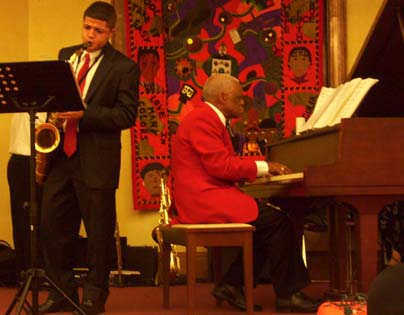December 20, 2012
 Great Hall recital: David Brown performed at the Great Hall last month during a recital organized by Fred Williams, right, who accompanied Brown on piano. Photo by Tayla Holman
Great Hall recital: David Brown performed at the Great Hall last month during a recital organized by Fred Williams, right, who accompanied Brown on piano. Photo by Tayla Holman
At 84 years old, Fred Williams has spent much of his life studying and playing music. Today, the Mattapan resident is best known as a mentor and instructor to budding musicians from Boston’s neighborhoods.
Williams started his Music Development and Enrichment Program, a non-profit organization, in 2002 as a way to teach children and adults how to learn and appreciate music. On Nov. 30, Williams gathered his best students for a recital at Codman Square’s Great Hall.
The recital consisted of current and former students and special guests, with participants ranging in age from 6 to 64 at different stages in their musical training. There were also a couple of performances, either solo or duet, by Williams. At the end of each performance, students were given trophies to recognize their achievements.
Originally from St. Louis, Williams came to Boston in 1951 to study at the Boston Conservatory of Music in Fenway. Prior to that, he played in the first integrated band in the US Army from 1946 to 1949. While he was in the service, he toured with Flip Wilson. He was also chosen to perform for the Crown Prince of Oslo, Norway. He also studied the flute and the clarinet in Germany with classical musicians.
After returning to the United States in 1950, Williams performed with artists such as Dinah Washington, Jimmy Witherspoon, Roy Hamilton and Clark Terry.
Williams came from a musical family and, he says, it was only natural that he would become a musician himself. His grandmother was a pianist and his “whole family was into music at one point or another.”
One of his sons, Roderick, studied the drums, and played on the saxophone in a duet with his father during the Codman Square recital. His other son, Reggie, “could have been a good bass player, if he stuck with it,” Williams said.
Williams himself plays at least 12 different instruments, and teaches all of them as well. He can also play alto and tenor at the same time.
“The program will teach children how to play an instrument, and to know everything about it,” Augusta Gale, Williams’ wife, said. “We are fortunate to have the master here to teach them.”
One student, 14-year-old Matthew Paul Suprilus, particularly impressed the audience with a flawless performance of Beethoven’s “Fur Elise.” He has only been taking lessons for two years and had no prior training before working with Williams. He received thunderous applause at the end of his performance.
Since the program is a non-profit, donations were collected at the end of the night to benefit the students.
“We are here tonight because we truly want to give a scholarship next year,” Gale said. “Our first recipient received a scholarship last year and he is now performing in Hollywood.”
Williams has students all over the world, including Moscow, Dubai and New York. Students under his instruction have received scholarships to Dartmouth, Yale, Berklee and, his alma mater, Boston Conservatory. He provides private instruction in all wind, brass, string and keyboard instruments.
Williams also taught jazz, improvisation, music theory and composition at Grace Church of All Nations in Dorchester. He has also composed over 25 jazz and classical songs.
At the end of the evening, Williams performed a soulful rendition of “His Eye is on the Sparrow” on the saxophone. He also performed duets with his son, Roderick, and one of his students, David Brown.
“All music is played with soul, even the classics,” Williams said.
Williams has received several awards and recognitions for his accomplishments and contributions over the years. In 1985, he was awarded the Massachusetts Black Caucus Family Award. He was recognized three times by the Massachusetts House of Representatives for his contributions to the entertainment industry and to the community.
Williams was also given a Boston Police community service award for his commitment to neighborhood crime watch, and was the president of the Mattapan Improvement Association from 1970 to 1976.
While Williams plans to continue teaching private lessons, he also hopes to teach at a college level and to teach special needs children. He also hopes to set up bands and music instruction programs for low socio-economic children and adults and men and women in institutional settings.
Topics:


